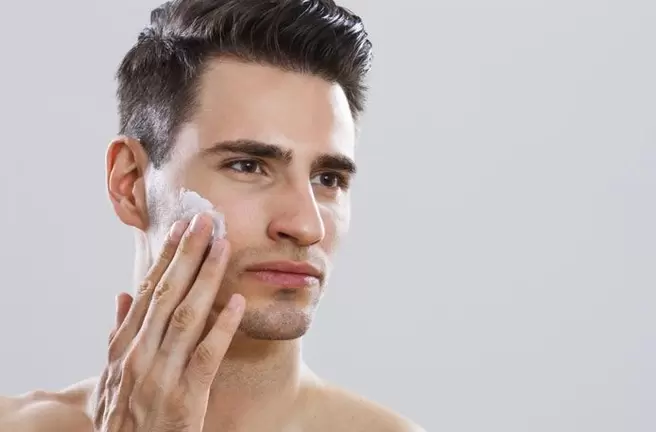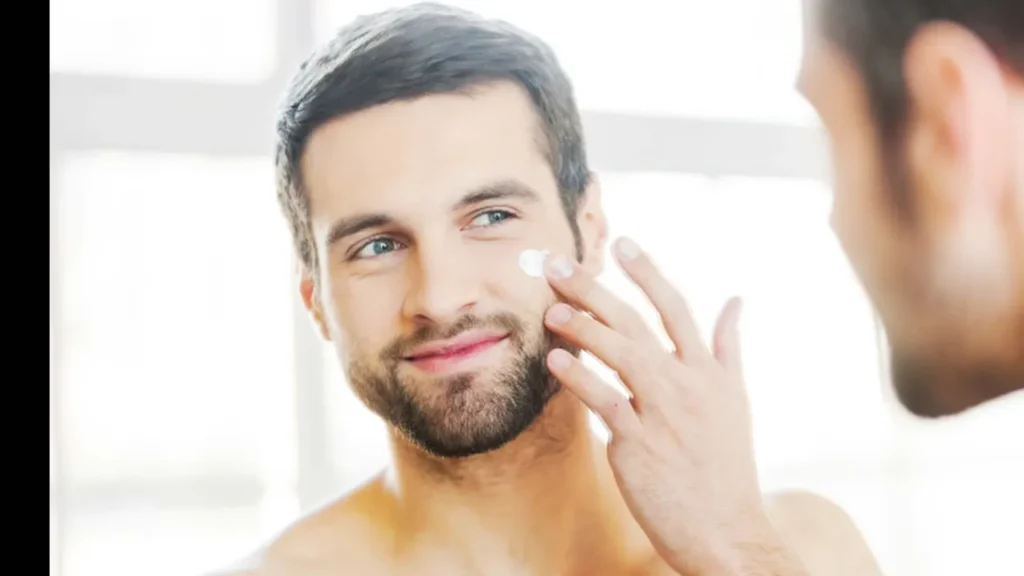When incorporating acne cream into your skincare routine, it’s generally recommended to apply it before your moisturizer. This sequence allows the active ingredients in the acne cream to penetrate the skin effectively and target specific acne concerns. After applying the acne cream, follow up with a suitable moisturizer.
In addition, moisturizing is essential to prevent excessive dryness, a common side effect of acne medications. It helps maintain skin hydration and can complement the effects of acne treatment.
Additionally, using sunscreen is crucial, especially during the day after applying acne medication and moisturizer, as certain acne treatments may increase sensitivity to the sun. Ensuring a consistent routine, paying attention to your skin’s response, and consulting a dermatologist for personalized advice are key considerations for an effective acne skincare regimen.
Skincare Routine: Step-by-Step

Establishing an effective skincare routine is a significant achievement in the pursuit of healthy, glowing skin. Once you’ve found a regimen that works for you, understanding the correct order of product application becomes essential for optimal results. Here’s a detailed guide to your morning and nighttime skincare routine:
Morning Skincare Routine:
- Cleanser:
- Begin your day with a gentle cleanser, using warm water to remove makeup, oils, and impurities. Consider enhancing your cleansing routine with a FOREO device for a one-minute sonic cleanse.
- Toner:
- Follow up with a toner to hydrate the skin and prepare it for subsequent products. Toners have evolved over the years, offering varied formulations for different skin types and concerns.
- Serum:
- Apply a nutrient-dense serum to address specific skin concerns such as blemishes, fine lines, and discoloration. Serums play a vital role in elevating your skincare routine.
- Eye Cream:
- Prioritize eye cream application before heavier products. This step is essential for those targeting aging and under-eye concerns, given the sensitive nature of the skin in that area.
- Spot Treatment:
- For targeted concerns like blemishes and uneven skin tone, use spot treatments in the evenings. Apply before moisturizer to ensure full penetration.
- Moisturizer:
- Apply a moisturizer twice daily, irrespective of skin type. Choose a lighter option for the morning and a heavier one for the evening. Moisturizer not only hydrates but also enhances the effectiveness of previous products.
- Retinol:
- If incorporating retinol into your routine, consult your esthetician and start slowly. Apply a pea-sized amount after moisturizer to minimize skin irritation.
- Sunscreen:
- Conclude your morning routine with sunscreen, choosing a broad-spectrum option with SPF between 15 and 30. Sunscreen acts as a protective layer against sun damage.
Note: If using retinol, inform your service provider and skip it for about 7 days before waxing treatments.
Evening Skincare Routine:
Repeat steps 1 through 7, excluding sunscreen. Save the retinol application for the evening, following the same guidelines.
Furthermore, adapting an eight-step skincare routine might seem extensive, but each step serves a purpose in achieving optimal skin health. While not every product may be necessary for everyone, the knowledge provided ensures you know when and how to apply the products tailored to your skincare needs. Knowledge is key in unlocking the full potential of your skincare routine.
When to Incorporate Acne Treatment in Your Skincare Routine
Maintaining an effective skincare routine is crucial for managing acne-prone skin. Daily efforts to control excess oil and ensure clear pores are essential. However, finding the right routine can be challenging.
Moreover, avoid harsh soaps, as they may irritate the skin without effectively treating acne. Instead, opt for over-the-counter products from a drugstore. Even if your acne persists, aggressive products can compromise skin hydration. Counteract dryness by applying a light moisturizer twice daily, preferably in gel or lotion form.
Further, given the potential for sun damage from acne medications and exfoliants, sun protection is paramount. A comprehensive acne skincare routine includes a cleanser, toner, acne medication, moisturizer, and sunscreen. Some moisturizers may also incorporate SPF for added sun protection.
For facial-specific sunscreens, seek products designed for the face. This approach ensures not only acne management but also safeguards your skin from harmful UV rays.
Understanding Acne Cream
Acne cream is a topical skincare product designed to address and manage acne-related concerns. These creams typically contain active ingredients that target specific factors contributing to acne, such as excess oil production, inflammation, and bacterial growth. Here’s a breakdown of key aspects to understand about acne creams:
- Active Ingredients:
- Acne creams often incorporate active ingredients like benzoyl peroxide, salicylic acid, or retinoids. Each ingredient serves a unique purpose, such as reducing inflammation, unclogging pores, or promoting skin cell turnover.
- Benzoyl Peroxide:
- Known for its antibacterial properties, benzoyl peroxide helps kill acne-causing bacteria. It also assists in unclogging pores and reducing excess oil production. It is commonly found in over-the-counter acne creams.
- Salicylic Acid:
- Salicylic acid is a beta-hydroxy acid that exfoliates the skin, helping to remove dead skin cells and prevent clogged pores. It is effective for treating blackheads and whiteheads.
- Retinoids:
- Retinoids, derived from vitamin A, promote skin cell turnover and prevent the formation of comedones (clogged pores). They are often used for more severe acne and are available in prescription-strength creams.
- Inflammation Reduction:
- Many acne creams aim to reduce inflammation associated with acne lesions. This can help minimize redness and swelling, contributing to an improved overall appearance of the skin.
- Moisturization:
- Some acne creams may cause dryness or peeling as a side effect. It’s essential to balance the use of acne creams with a suitable moisturizer to keep the skin hydrated and prevent excessive dryness.
- Application Timing:
- Acne creams are typically applied after cleansing and toning, as part of your skincare routine. The specific instructions for application may vary based on the product, so it’s crucial to follow the guidelines provided.
- Sun Protection:
- Certain acne medications, especially retinoids, can increase sensitivity to sunlight. Incorporating sunscreen into your daily routine is important to protect your skin from potential sun damage.
- Consultation with a Dermatologist:
- For persistent or severe acne, consulting with a dermatologist is advisable. They can recommend prescription-strength acne creams or other tailored treatments based on your skin’s specific needs.
Understanding Moisturizer
- Hydration and Barrier Function:
- The primary function of a moisturizer is to hydrate the skin. It works by trapping and retaining water in the outer layer of the skin, enhancing its natural barrier function.
- Ingredients:
- Moisturizers contain a combination of water, humectants (which attract water to the skin), emollients (which smooth and soften the skin), and occlusives (which form a protective layer to reduce water loss). The specific ingredients vary based on the formulation and intended use.
- Humectants:
- Common humectants in moisturizers include glycerin, hyaluronic acid, and urea. These ingredients draw water to the skin’s surface, helping to keep it hydrated.
- Emollients:
- Emollients such as oils and butter create a smooth, soft texture on the skin by filling in gaps between skin cells. This helps improve the skin’s appearance and texture.
- Occlusives:
- Occlusives like petrolatum and beeswax form a protective barrier on the skin, preventing water loss and enhancing moisture retention.
- Types of Moisturizers:
- Moisturizers come in various forms, including creams, lotions, gels, and ointments. The choice depends on individual preferences, skin type, and specific needs. Creams are often more hydrating, while gels may be lighter and suitable for oily skin.
- Skin Types:
- Different moisturizers cater to specific skin types. For example, individuals with dry skin may benefit from richer, more emollient formulations, while those with oily or combination skin might prefer lighter, non-comedogenic options.
- Daily Application:
- Applying moisturizer regularly is recommended, ideally after cleansing and toning. It helps restore moisture lost during cleansing and creates a protective layer to shield the skin throughout the day.
- Seasonal Adjustments:
- Skin hydration needs can vary with the seasons. In colder, drier weather, a more emollient moisturizer may be necessary, while a lighter option may suffice in warmer, more humid conditions.
- Sunscreen and Moisturizer:
- Some moisturizers come with added sun protection, streamlining the skincare routine. However, if your moisturizer lacks SPF, it’s essential to apply a separate sunscreen to protect the skin from UV rays.
Considerations and Tips

Patch Testing:
- Always perform a patch test before applying any new acne cream on your face. To do this, apply a small amount on the inside of your forearm, leave it for 24-48 hours, and check for redness, swelling, or itching. If you notice any adverse reactions, avoid using the cream on your face.
Choosing Compatible Products:
- Select an acne cream compatible with your skin type and other products. For instance, if you have dry skin, avoid overly drying creams. Ensure compatibility with your existing skincare products, such as moisturizers or sunscreen, to prevent any interactions.
Consulting with a Dermatologist:
- If you’re uncertain about it use or have severe acne, consult a dermatologist. They can recommend the right cream for your skin, monitor progress, and address any concerns or adverse effects.
Sunscreen Use During the Day:
- Some are heighten sun sensitivity, necessitating daily sunscreen use, even on cloudy days. Choose a broad-spectrum sunscreen with SPF 30 or higher. Apply generously 15 minutes before going outside and reapply every two hours, or more if sweating or swimming.
Additional Tips:
- Face Washing: Cleanse your face twice daily with a gentle cleanser.
- Targeted Application: Apply acne cream only to affected areas.
- Hands Off: Avoid touching your face during the day.
- Avoid Picking: Resist the urge to pick at acne.
- Patience is Key: Results may take weeks or months, so be patient with the process.
FAQ’s
Do you put acne treatment before or after moisturizer?
Moisturizer should be applied after acne treatment. Using moisturizer helps acne medications penetrate the skin better and prevents medications from drying out your skin.
Should you put acne gel or moisturizer on?
Yes, using a moisturizer can be beneficial when using acne treatments like benzoyl peroxide or salicylic acid. It helps counteract dryness caused by these treatments.
Should you use moisturizer with acne treatment?
Yes, some physicians recommend using moisturizers as adjunctive treatment for acne, especially when prescribed with topical benzoyl peroxide or a retinoid. Moisturizers can independently improve signs and symptoms of acne.
Do you put Cleargel on before or after moisturizer?
Apply Cleargel AP Gel first and wait for 30 minutes before using other lotions, creams, or moisturizers. Using them simultaneously may reduce the effectiveness of Cleargel AP Gel.
How long to wait between acne cream and moisturizer?
For maximum efficacy, wait for 1 minute after applying prescription topical acne medications before applying serums and moisturizers on top. This allows the acne treatment to fully absorb into the skin.
Final Words:
It’s best to apply acne cream before moisturizing in your skincare routine. This order helps the active ingredients in the acne cream work better on specific acne issues. After using the acne cream, make sure to follow up with a suitable moisturizer to prevent excessive dryness, which can happen with acne treatments.
Moreover, using sunscreen during the day is crucial, especially after applying acne medication and moisturizer, as some treatments may increase sun sensitivity. Consistency in your routine, paying attention to your skin’s response, and seeking advice from a dermatologist is key to effective acne care.

